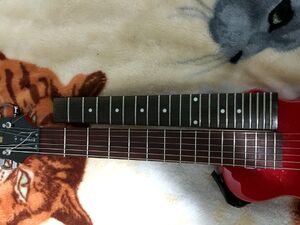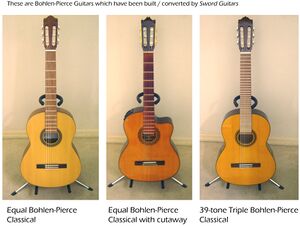Bohlen–Pierce scale
The Bohlen–Pierce scale (BP) is a 13-tone macrotonal nonoctave scale designed to emphasize odd-number intervals and chords, such as the 3:5:7:9 tetrad. It was first described as a 7-limit just intonation scale and as an equal temperament, 13 equal divisions of the tritave. The tritave (3/1) usually replaces the octave in the role of the equave, such that intervals a tritave apart are considered equivalent.


It is closely related to the rank two temperament bohpier. It is normally thought of (if not in these terms, then in fact) as a temperament defined on the 3.5.7 subgroup. However, it can be extended to the 3.5.7.11/4 subgroup, especially when considering 13edt instead of the JI version. This extension is controversial because of the presence of 2 in the denominator of 11/4, but the interval is present in the sense that 3^(12\13) provides an approximation to it. Chords of Bohlen–Pierce, from this extended perspective, may be found listed on the page chords of bohpier.
Bohlen–Pierce was discovered independently by Heinz Bohlen, John Pierce, Kees van Prooijen, and perhaps others, usually noticed for its good approximation of odd-number just ratios 3:5, 5:7, 3:7, etc.; but not necessarily 4:11, 5:6, 6:7, etc.
Theory
Lambda scale
Intervals
Variations
Triple Bohlen–Pierce
Proposed by Paul Erlich is 39edt, also known as the Triple Bohlen–Pierce scale. It adds to 13edt accurate approximations to the 11th and 13th harmonics (11/9 and 13/9) and can be used in a variety of ways, for both just intonation chords and harmonies, as standard Bohlen–Pierce scale interlocking three times with calm-sounding quarter-tones, and for various JI modulations.
Regular temperament properties
Instruments
- Bohlen Pierce guitar
- Clarinets
- Metallophone
- Electronic Organ
- Stredici
- Kalimba (Mbira)
- Pedal Steel Guitar
Music
- See also: Category:Bohlen-Pierce tracks
